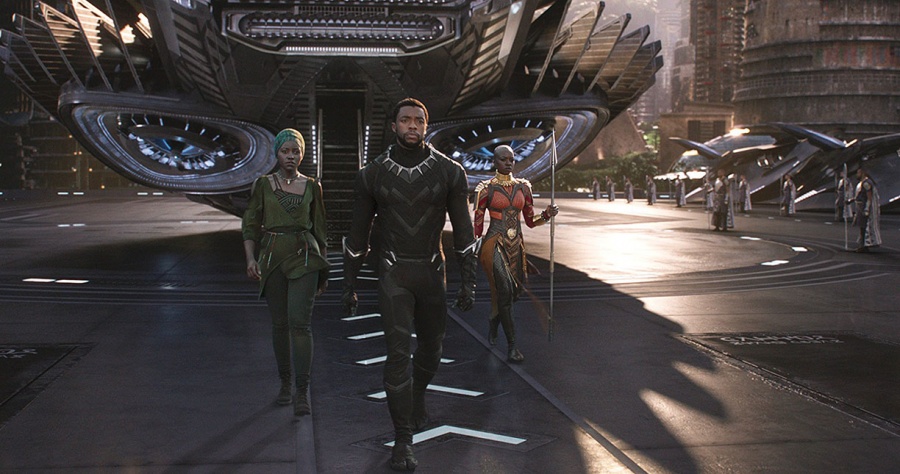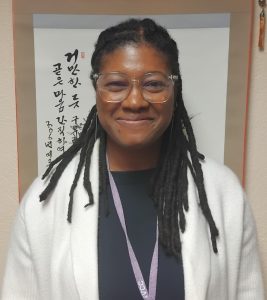‘Black Panther’ smashes records for good reason
Prowl Chadwick Boseman, Danai gurira and Lupita Nyong’o appear in “Black Panther”
March 8, 2018
Editor’s note: This column contains spoilers.
“Wakanda Forever!” says Okoye, General of the Dora Milaje in “Black Panter., as will all of us for years to come.
Box Office Mojo shows the movie grossing over $421 million globally on its four-day opening weekend. “Black Panther” has shattered records, placing it immediately in the fifth place above “Captain America: Civil War” and “Deadpool” for opening weekend. Originally meant to gross around $162 million domestically, the film gained over $260 million domestically within four days.
As of March 19*, its domestic total is estimated to be $607,215,681, making it the 7th highest domestic release on record.
Hollywood has a long history of underestimating black-dominated films and then watching them do better than projected. Moreover, during our new age of acceptance, black films like “12 Years a Slave” and “Get Out” or even a “Madea” showing exceed the expectations depsite a low budget or lack thereof from Hollywood.
I took a “Black Panther” personality test to determine which character I am. I received that of Black Panther because of my calm and humble mind, sacrifice, and selflessness. But I couldn’t help but be more drawn to Erik Killmonger.
Inside “Black Panther,” the story follows immediately after the events of “Captain America: Civil War.” T’Challa—the Black Panther—is returning to Wakanda to be accepted as King by the tribes.
However, the opening scene starts with a flashback of Prince N’Jobu telling N’Jadaka (soon to be Killmonger) the origins of their country: the five tribes fighting for power in a time predating those they refer to as the “Colonizers,” a complete history of the first Black Panther, the placing of vibranium in their lands and how it changed the lands and lives.
In addition, he explains the Panther Fruit that allows the strength of the Panther God Bast to be bestowed to the Panther Tribe. After the unification of only four tribes under the Panther King, one tribe—Jabari— refused the unification and headed for the mountains.
Ageing the years but within the flashback, Prince N’Jobu is in Oakland, Calif. who receives a visit from his brother, King T’Chaka. N’Jobu at this time is a war dog, who has been spying on the colonist government of America. There are war dogs all over the world, watching the events unfold.
T’Chaka greets his brother as the Black Panther but unhelmets himself to hug his baby brother. Things get serious as he then confesses that vibranium was stolen from Klaue and that the only person knowing how to obtain it could be him, N’Jobu.
All the while, kids are playing hoop on the court outside. N’Jobu tries to lie, but James, future royal priest known as Zuri, speaks the truth to his king. In comics, defying the King and jeopardizing the people of Wakanda meant the end of your life. But being the baby brother of the King, King T’Chaka opted to imprison him instead.
Living as a black man in the United States instead of Utopian Wakandian, you would rather be dead than in chains. In a dishonorable move, N’Jobu drew his pistol on James and fired.
T’Chaka took the shot that disintegrated when it hit the Panther Suit and put his claws into his baby brother and left him for dead.
Little do we know that one child on that court outside was N’Jadaku, the son of N’Jobu.
From there, most of the story unfolds with that boy, now an adult, as Erik “Killmonger” Stevens. Killmonger talks about being black in America throughout the film. In a West African exhibit, he questions the expert, who appears as a white woman, about the artifacts.
When he encounters the vibranium artifact he’s looking for, he tells her he’s going to take it from her, and she believes he can’t. Then, Killmonger says what every black person is thinking: “How do you think your ancestors got these? Do you think they paid a fair price? Or did they take it, like they took everything else?”
Killmonger doesn’t stop there. Later, when seeing his father in the spiritual realm after receiving the Panther Fruit, his father asks, “No tears for me?”
Stevens, who appears as a child in this realm, said, “Everybody dies; it’s just life around here,” speaking of inner-city ghettos and their treatment of blacks. Adult Stevens later cries with his father.
And to top off the end of the movie, Killmonger, while taking his last breaths at sunset, delivers shocking and tearjerking words: he remembers how his father once said the Wakanda sunsets are the most beautiful in the world.
T’Challa suggests that Killmonger can live, but Killmonger has other plans: “Why? So you can just lock me up? Nah. Just bury me in the ocean with my ancestors who jumped from the ships. Because they knew death was better than bondage.” Killmonger takes the spearhead from his wound and dies.
In this film, he has only said what many black people have felt and wanted to say their whole lives. We may have gotten the history and culture of Wakanda, but we got the story of Killmonger more than T’Challa.




